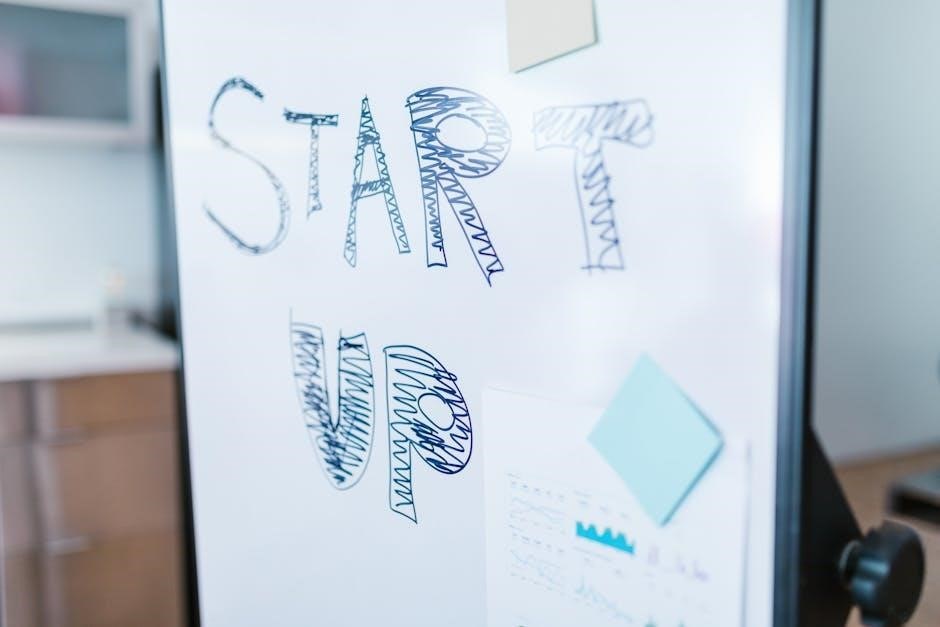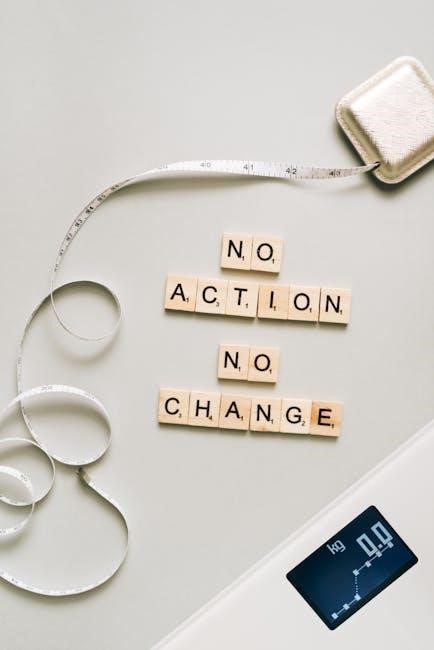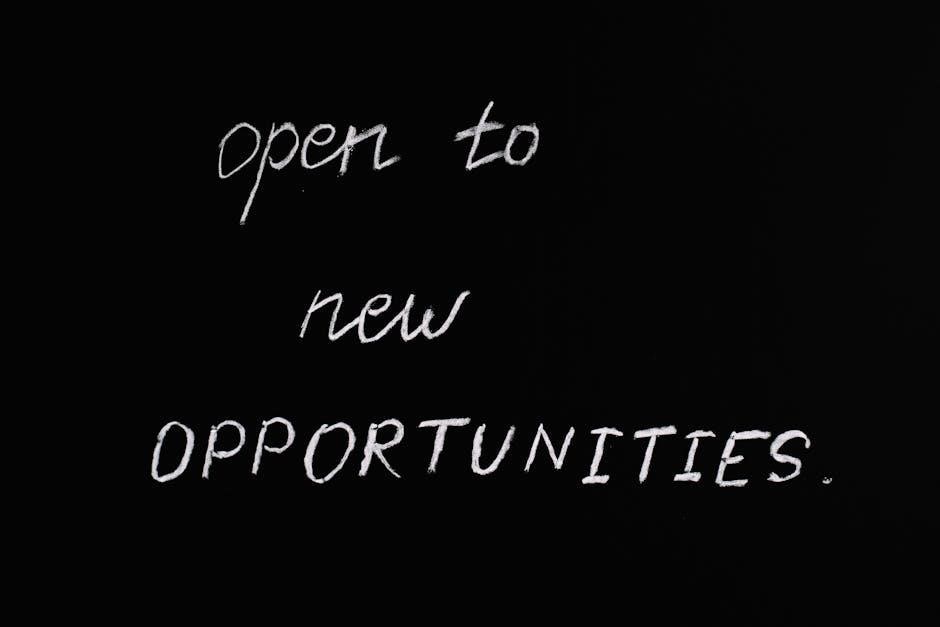
The concept of growth mindset vs fixed mindset pdf is discussed by Carol Dweck, introducing two mindsets that affect our lives, with growth mindset embracing challenges and fixed mindset fearing failure always naturally.
Definition of Fixed and Growth Mindsets
The definition of fixed and growth mindsets is a fundamental concept in understanding the differences between these two mindsets. According to research, a fixed mindset is the belief that one’s abilities and intelligence are innate and unchangeable, whereas a growth mindset is the belief that abilities and intelligence can be developed and improved through effort and learning. This definition is crucial in understanding how individuals perceive challenges and obstacles, and how they respond to failure and criticism. The fixed mindset is often characterized by a fear of failure and a need for validation, whereas the growth mindset is characterized by a love of learning and a resilience in the face of challenges. By understanding the definition of fixed and growth mindsets, individuals can begin to recognize their own mindset and take steps to develop a growth mindset, leading to greater success and fulfillment in their personal and professional lives. This understanding can be applied in various contexts, including education and personal development.
Key Differences Between Fixed and Growth Mindsets
The key differences between fixed and growth mindsets lie in their underlying beliefs and attitudes towards challenges, failure, and success. Individuals with a fixed mindset believe that their abilities are innate and unchangeable, whereas those with a growth mindset believe that their abilities can be developed and improved. This fundamental difference in belief leads to distinct differences in behavior, with fixed mindset individuals often avoiding challenges and growth mindset individuals embracing them. Additionally, fixed mindset individuals tend to be more concerned with appearing intelligent and talented, whereas growth mindset individuals are more focused on learning and improving. These differences have significant implications for motivation, resilience, and overall well-being, and can be observed in various aspects of life, including education, career, and personal relationships. By understanding these key differences, individuals can gain insight into their own mindset and develop strategies to cultivate a growth mindset. This can lead to greater fulfillment and success in their personal and professional lives.

Characteristics of a Fixed Mindset
People with fixed mindsets fear failure and avoid challenges naturally always.
Belief in Fixed Intelligence

Individuals who possess a fixed mindset believe that their intelligence is inherent and unchangeable, this notion is deeply ingrained in their perception of themselves.
They think that their abilities and intelligence are fixed traits that cannot be developed or improved upon, and this belief influences their behavior and decision-making.
According to research, people with a fixed mindset are more likely to avoid challenges and give up easily when faced with obstacles, as they believe that their abilities are limited and cannot be improved.
This belief in fixed intelligence can have significant consequences, as it can lead to a lack of motivation and a fear of failure, ultimately hindering personal growth and development.
The concept of fixed intelligence is closely related to the idea that people are either born with a certain level of intelligence or they are not, and that it cannot be changed.
This mindset can be limiting and can prevent individuals from reaching their full potential, as they may not be willing to take risks or push themselves beyond their perceived limitations.
Overall, the belief in fixed intelligence is a key aspect of the fixed mindset, and it can have a profound impact on an individual’s life and achievements.
Reaction to Criticism and Failure
People with a fixed mindset react negatively to criticism and failure, as they perceive it as a personal attack on their abilities.
They tend to become defensive and dismissive, and may even deny or rationalize their mistakes.
This reaction is rooted in their belief that their intelligence and abilities are fixed, and that failure or criticism is a reflection of their inherent worth.
In contrast, individuals with a growth mindset are more likely to view criticism and failure as opportunities for growth and learning.
They are more open to feedback and willing to take risks, as they believe that their abilities can be developed and improved.
The reaction to criticism and failure is a key differentiator between the fixed and growth mindsets, and it has significant implications for personal and professional development.
Individuals with a fixed mindset may struggle to learn from their mistakes and improve over time, while those with a growth mindset are more likely to thrive in the face of challenges and setbacks.
By understanding these different reactions, individuals can begin to shift their mindset and develop a more growth-oriented approach to criticism and failure.

Characteristics of a Growth Mindset
Embracing challenges and persisting through obstacles with resilience and determination always naturally happens.
Belief in Changeable Intelligence
People with a growth mindset believe that their intelligence can be developed and changed through hard work and dedication. This belief is central to the growth mindset and allows individuals to approach challenges with confidence and resilience. According to Carol Dweck, individuals with a growth mindset see intelligence as something that can be developed, rather than something that is fixed at birth. This belief in changeable intelligence leads to a focus on learning and improvement, rather than a fear of failure. With a growth mindset, individuals are more likely to take on new challenges and persist in the face of obstacles, leading to greater personal and professional growth. The belief in changeable intelligence is a key factor in the development of a growth mindset and is essential for achieving success and fulfillment in life. It is a fundamental aspect of the growth mindset that allows individuals to reach their full potential.
Embracing Challenges and Learning
Individuals with a growth mindset tend to embrace challenges and view them as opportunities for learning and growth. They believe that challenges help to develop new skills and abilities, and that learning from failures is an essential part of the growth process. With a growth mindset, people are more likely to take on new challenges, even if they are difficult or outside of their comfort zone. They see challenges as a way to learn and improve, rather than as a threat to their ego or self-image; This approach to challenges allows individuals with a growth mindset to develop a sense of resilience and perseverance, and to view obstacles as stepping stones to success. By embracing challenges and learning, individuals with a growth mindset can continue to grow and develop throughout their lives, and can achieve greater success and fulfillment. This mindset is essential for personal and professional development, and can have a significant impact on overall well-being and happiness.

Practical Applications of the Growth Mindset
Applying growth mindset in daily life improves productivity and performance naturally always.
Overcoming Obstacles and Embracing Failure
Embracing failure is a crucial aspect of the growth mindset, as it allows individuals to learn from their mistakes and use them as opportunities for growth and improvement.
By adopting this mindset, people can overcome obstacles and develop resilience, which is essential for achieving success in various areas of life.
A growth mindset enables individuals to reframe failures as learning experiences, rather than as threats to their ego or self-worth.
This, in turn, allows them to approach challenges with a sense of curiosity and excitement, rather than fear and anxiety.
As a result, they are more likely to persist in the face of obstacles and to develop the skills and knowledge they need to overcome them.
Overall, embracing failure and overcoming obstacles are critical components of the growth mindset, and are essential for achieving personal and professional growth and success.
By cultivating a growth mindset, individuals can develop the skills and resilience they need to succeed in an ever-changing world.
This mindset is essential for achieving success and happiness in life.
It helps individuals to stay motivated and focused on their goals.
And to develop a sense of purpose and direction.
Which is necessary for achieving fulfillment and satisfaction.
And for living a happy and successful life.
Developing a Growth Mindset Through Practice and Awareness
Developing a growth mindset requires practice and awareness, as it involves recognizing and challenging one’s existing thoughts and beliefs.
Through self-reflection and mindfulness, individuals can become more aware of their thoughts and emotions, and learn to reframe them in a more positive and growth-oriented way.
By practicing self-compassion and self-awareness, individuals can develop a greater understanding of their strengths and weaknesses, and learn to approach challenges with a sense of curiosity and excitement.
This can involve setting goals and working towards them, seeking out feedback and learning from criticism, and embracing challenges and viewing them as opportunities for growth.
By cultivating a growth mindset through practice and awareness, individuals can develop the skills and resilience they need to succeed in an ever-changing world.
It is a process that takes time and effort, but it can lead to greater fulfillment and satisfaction in life.
And help individuals to reach their full potential and achieve their goals.
With consistent practice and awareness, a growth mindset can become a natural part of one’s mindset.
And lead to greater success and happiness in life.
And a more positive and resilient outlook on life.